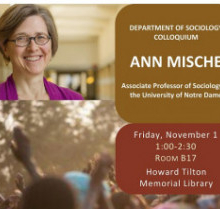
The Department of Sociology Colloquium
“Foresight methods as transnational interventions: mapping a field of practice”
Abstract: This paper examines the use of cultural techniques for “futures thinking” in transnational debates and interventions through a comparative analysis of “public interest” scenario processes since the 1990s. Scores of public interest scenario workshops have taken place around the world in the past three decades, focusing on problems such as conflict prevention, food security, youth, migration, urbanization, civil society, democratization, and adaptation to climate change. Some are national in scope (the future of Kenya or Indonesia) while others have global, regional, or municipal focus (the future of global climate governance, democracy in Latin America or urban informality in Bangkok). Scenario approaches distinguish themselves from both positivist forecasting (what will happen) and normative visioning (what should happen). Instead, they use narrative, visual and performative techniques to create multiple storylines for what could happen, with attention to complexity, contingency, and multi-linear causality. Scenario exercises are designed to help collectivities take the “long view,” grapple with diverse perspectives, and develop robust responses to problematic and uncertain situations. My analysis focuses the use of scenario methods by reform actors in the Global South working in the intertwined areas of democracy, development, peacebuilding and climate change, as well as on their links to transnational networks of sponsors and partners. Drawing on an original database of over 230 scenario reports since 1990, I analyze the multi-sectoral networks constituted by initiation, facilitation, funding and participation in public interest scenario processes. I compare the geographic scope of the scenarios (global, regional, national, urban, community) as well as their sectoral, methodological and topical engagement. I also examine degree to which these processes are sponsored by elite actors and powerholders, or conversely, represent attempts by reformist actors to challenge powerholders in local, national or transnational political arenas.
